五年级下册英语单元集体备课活动记录
部编人教版五年级英语下册第四单元集体备课教案
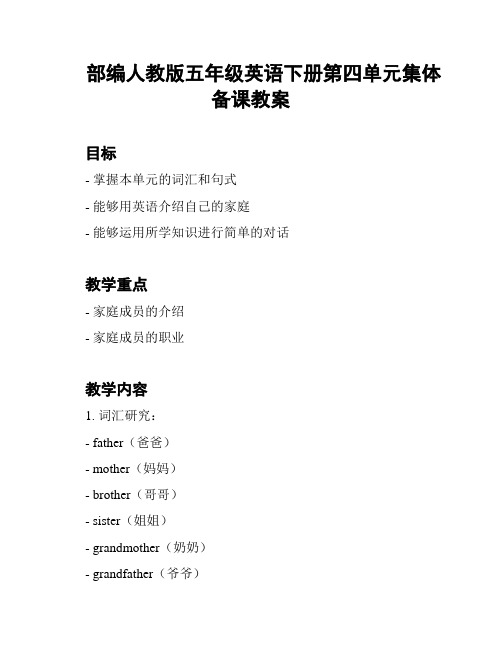
部编人教版五年级英语下册第四单元集体备课教案目标- 掌握本单元的词汇和句式- 能够用英语介绍自己的家庭- 能够运用所学知识进行简单的对话教学重点- 家庭成员的介绍- 家庭成员的职业教学内容1. 词汇研究:- father(爸爸)- mother(妈妈)- brother(哥哥)- sister(姐姐)- grandmother(奶奶)- grandfather(爷爷)- doctor(医生)- teacher(老师)- farmer(农民)- worker(工人)2. 句型研究:- This is my father.(这是我的爸爸。
)- What does your mother do?(你妈妈做什么工作?)- She is a doctor.(她是一名医生。
)- My brother is a teacher.(我的哥哥是一名老师。
)3. 对话练:- A: This is my sister. What does your father do?- B: He is a worker.4. 听力训练:- 听录音,判断图片和句子是否匹配。
5. 读写练:- 阅读短文,回答问题。
教学步骤1. 词汇研究:- 师生一同研究并拼读新词汇,学生可以通过图片和动作来记忆词汇的含义。
2. 句型研究:- 教师板书相关句型,并进行解释和示范。
学生跟读并进行实际练。
3. 对话练:- 学生自由搭配家庭成员的介绍,并进行对话练。
4. 听力训练:- 听录音,学生判断图片和句子是否匹配,进一步巩固词汇和句型。
5. 读写练:- 学生阅读一篇关于家庭的短文,回答相关问题。
扩展活动1. 角色扮演:- 学生分组进行角色扮演,模拟对话练。
2. 家庭介绍:- 学生可以用英语对自己的家庭进行介绍,并互相交流。
参考资料教材:部编人教版五年级英语下册。
五年级下册英语集体备课记录五年级英语集体备课活动记录7
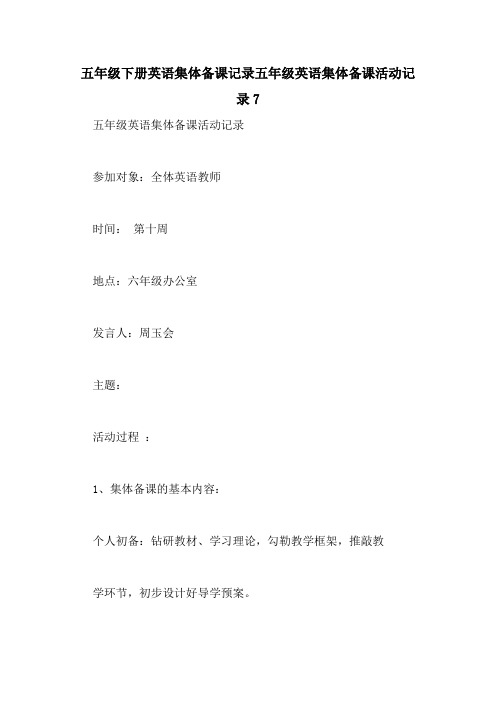
五年级下册英语集体备课记录五年级英语集体备课活动记
录7
五年级英语集体备课活动记录
参加对象:全体英语教师
时间:第十周
地点:六年级办公室
发言人:周玉会
主题:
活动过程:
1、集体备课的基本内容:
个人初备:钻研教材、学习理论,勾勒教学框架,推敲教
学环节,初步设计好导学预案。
共同备课:上周授课产生的问题展开研讨。
对下周的授课内容共同探讨。
个人细备:在集体研讨的基础上结合自己的教学风格及班级学生的特点相互借鉴合理取舍,形成有个性特点的教学设计。
2 ,在小组内对各种课型共同探讨;备课组长组织同学科教师对相关学科的各类课模式进行探讨,进而明确每种课型的教学内容和教学方法。
3、将课堂中的重点、难点、困惑点进行探讨,对典型题、易错点要逐一列举。
4、个人在集体研讨基础上形成有可行性、实效性的。
5、由周玉会老师执笔,认真做好活动记录。
内容仅供参考。
五年级英语集体备课记录5
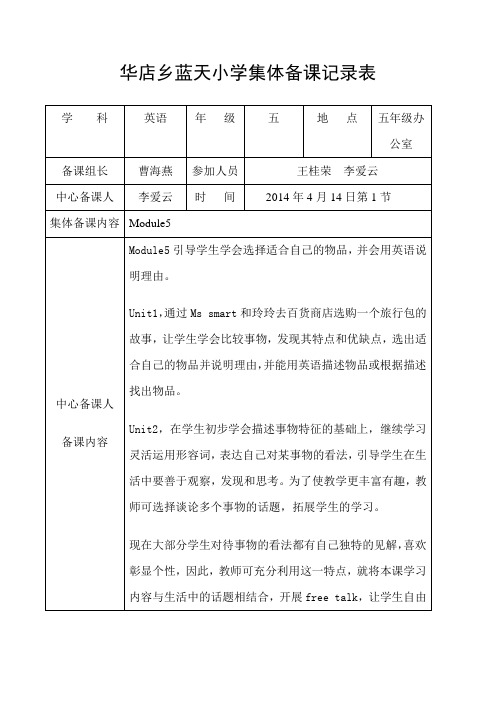
现在大部分学生对待事物的看法都有自己独特的见解,喜欢彰显个性,因此,教师可充分利用这一特点,就将本课学习内容与生活中的话题相结合,开展free talk,让学生自由畅谈,调动学生积极性,提高口语表达能力。
华店乡蓝天小学集体备课记录表
学科
英语
年级
五
地点
五年级办公室
备课组长
曹海燕
参加人员
王桂荣 李爱云
中心备课人
李爱云
时间
2014年4月14日第1节
集体备课内容
Module5
中心备课人
备课内容
Module5引导学生学会选择适合自己的物品,并会用英语说明理由。
Unit1,通过Ms smart和玲玲去百货商店选购一个旅行包的故事,让学生学会比较事物,发现其特点和优缺点,选出适合自己的物品并说明理由,并能用英语描述物品或根据描述找出物品。
备课过程
(其他教师
发言记录)
王桂荣:对这个模块要加强训练,重点讲解。特别是形容词描述事物的特征,发现其优缺点。选出适合自己的物品或表达自己对事物的看法。
备课小结
通过集体备课,明确了教学目标,掌握了教材的重难点,确定了教学 方向。
外研版一年级起始英语五年级下册集体备课记录

外研版一年级起始英语五年级下册集体备课记录
案例一:
一、分享备课内容枫叶课本:Unit3Ben’sfeetarebiggest.外研Module3-4
1. 何老师分享了自己的备课计划和教案内容;
2. 四位老师对教案内容讨论;
3. 何老师根据大家的意见修改教案。
二、英语课前演讲落实情况
1.三年级每节课三名学生上台演讲;
2.四年级每节课2-3名学生上台演讲。
3.讨论课前演讲在教学当中的效果。
三、备课组长做总结
1.总结这次会议;
2.安排下次会议的主讲人和内容。
案例二:
一、分享集体备课内容枫叶课本:Unit12Myweekatschool.外研Module3-41.方老师分享了集体备课计划和教案内容;
2.四位老师对教案内容讨论;
3.方老师根据大家的意见修改教案。
二、青年教师比武大赛的准备
1.三四年级定好课题(同课异构)
2.讨论使用的教学方法;
3.讨论AB班的教学方式。
三、备课组长做总结
1.总结这次会议;
2.安排下次会议的主讲人和内容。
外研版英语五年级下第一模块集体备课记录

单元
学情
分析
本模块的教学对象是小学五年级的学生。他们已经初步掌握了一些单词和句型。在日常生活中能用英语进行简单的对话交流。
同意
单元
教学
目标
1新单词life ,different, ago, any, other, lady
2教学难点:如何让学生在课堂上学会There be……,We lived…many years ago. We live…now.句型并能在生活中灵活运用该句型。
同意
单元
教学
设想
多听录音,让学生模仿语音语调。
设计一些活动,培养学生学习英语的兴趣,提高学生的技能。
同意
单元
课时
安排
共2课时
同意
外研版英语五年级下第一模块集体备课记录
集体备课时间
2月13日
集体备课内容
第一模块
主备人
参加人员
五年级全体英语教师
研讨内容
讨论意见
单元
教材
分析
本节课教学内容为三年级起点第六册的第一模块。本单元主要教学内容是Lingling, Sam和Amy在英国看关于中国的电视节目,对比中国老百姓过去和现在的生活条件,谈论生活中的变化。
2新句型:There be……, We lived…many years ago. We live…now.的教学
3能根据情境正确使用There be……,We lived…many years ago. We live…now.句型谈论生活、学习中的事物,提出问题并作出解答。
同意
单元
教学
重难
点
1教学重点:新单词和新句型的教学与运用。
牛津译林版五年级英语下册5B unit1--unit4复习课集体备课记录表
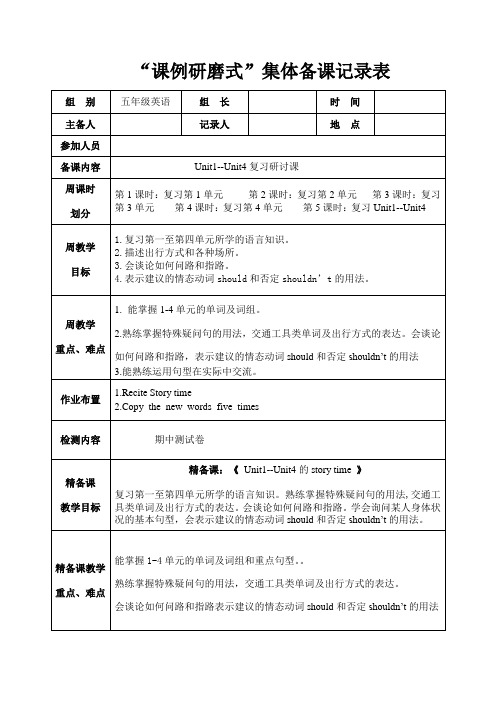
It is a place. It is small. We can send letters and cards there.
The postmen work there. It is a ___________.
7.看一部新电影8. walk to the zoo_______________
9.问路_____________10.ask a boy for help
二、单项选择。(共15分)
( )1. How can we ______ the zoo? ______ foot.
A. get;OnB. to get;ByC. get to ;On
复习已学词汇:根据老师的提示,让学生先读一读,再猜一猜,说出场所的名称。然后向学生出示各种场所标志的地图。加深巩固单词的学习,同时让学生看图说一说可以在这些地方做什么。
(1)It is a place. It is big. It is clean. We can see many doctors and nurses there. It is a ___________. .
3.能熟练运用句型在实际中交流。
作业布置
1.Recite Story time
2.Copy the new words five times
检测内容
期中测试卷
精备课
教学目标
精备课:《Unit1--Unit4的story time》
复习第一至第四单元所学的语言知识。熟练掌握特殊疑问句的用法,交通工具类单词及出行方式的表达。会谈论如何问路和指路。学会询问某人身体状况的基本句型,会表示建议的情态动词should和否定shouldn’t的用法。
pep五年级下册第一单元集体备课教案
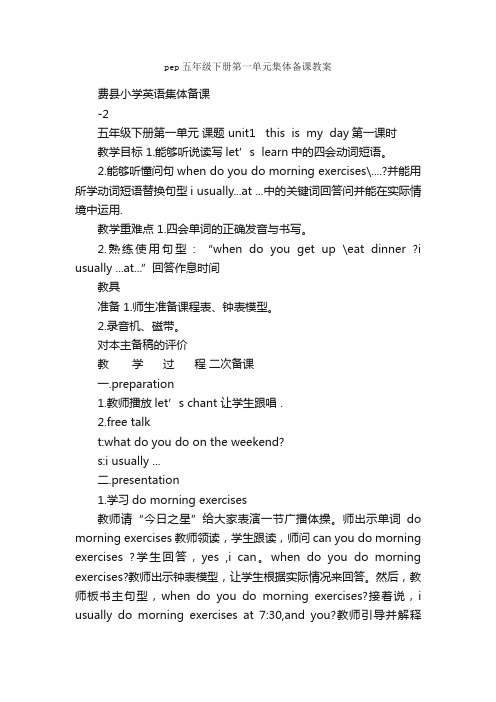
pep五年级下册第一单元集体备课教案费县小学英语集体备课-2五年级下册第一单元课题 unit1 this is my day第一课时教学目标 1.能够听说读写let’s learn中的四会动词短语。
2.能够听懂问句when do you do morning exercises\....?并能用所学动词短语替换句型i usually...at ...中的关键词回答问并能在实际情境中运用.教学重难点 1.四会单词的正确发音与书写。
2.熟练使用句型:“when do you get up \eat dinner ?i usually ...at...”回答作息时间教具准备 1.师生准备课程表、钟表模型。
2.录音机、磁带。
对本主备稿的评价教学过程二次备课一.preparation1.教师播放let’s chant 让学生跟唱 .2.free talkt:what do you do on the weekend?s:i usually ...二.presentation1.学习do morning exercises教师请“今日之星”给大家表演一节广播体操。
师出示单词do morning exercises教师领读,学生跟读,师问can you do morning exercises ?学生回答,yes ,i can。
when do you do morning exercises?教师出示钟表模型,让学生根据实际情况来回答。
然后,教师板书主句型,when do you do morning exercises?接着说,i usually do morning exercises at 7:30,and you?教师引导并解释usually和at。
2.学习play sports教师做动作,让学生猜一猜是干什么的。
然后说,yes ,i play sports every day you play sports every day ,too. 教师领读,学生跟读play sports,并让学生拼读单词。
pep人教版五年级下册英语第一单元单元整体教学课堂实录
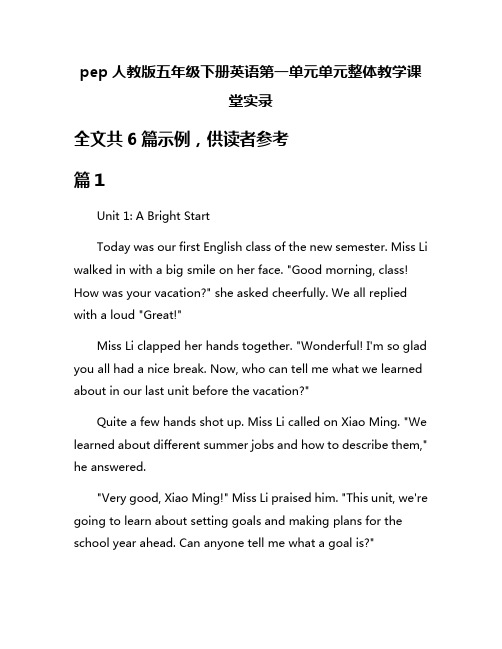
pep人教版五年级下册英语第一单元单元整体教学课堂实录全文共6篇示例,供读者参考篇1Unit 1: A Bright StartToday was our first English class of the new semester. Miss Li walked in with a big smile on her face. "Good morning, class! How was your vacation?" she asked cheerfully. We all replied with a loud "Great!"Miss Li clapped her hands together. "Wonderful! I'm so glad you all had a nice break. Now, who can tell me what we learned about in our last unit before the vacation?"Quite a few hands shot up. Miss Li called on Xiao Ming. "We learned about different summer jobs and how to describe them," he answered."Very good, Xiao Ming!" Miss Li praised him. "This unit, we're going to learn about setting goals and making plans for the school year ahead. Can anyone tell me what a goal is?"I raised my hand eagerly. Miss Li nodded at me. "A goal is something you want to achieve or accomplish," I explained."Excellent definition!" Miss Li said. "Setting goals is very important for success in life. Let's start with a fun activity - I want each of you to think of one goal you have for this school year. It can be anything - getting better grades, joining a club, or even something simple like reading more books."We all thought hard for a few minutes. Then Miss Li asked us to share our goals. There were all sorts of creative ones - Xiao Li wanted to win a writing contest, Xiao Zhang hoped to get on the football team, and Xiao Wang just wanted to be more organized with his homework.After we went around the class, Miss Li said, "Those are all wonderful goals! But how can we make sure we actually achieve them? The key is to make a plan with specific steps."She wrote an example on the board:Goal: Get an A in English classPlan:Pay attention in class and ask questionsDo all homework assignmentsReview material regularlyGet help from parents or teacher if struggling"Can you see how having a clear plan makes it much easier to work towards your goal?" Miss Li asked. We all nodded in agreement.Then it was our turn to make plans for our own goals. I decided my goal was to read 20 books this year, so my plan looked like:Read 30 minutes every night before bedBorrow books regularly from the libraryJoin the reading club at schoolAsk parents and teachers for book recommendationsOnce we had all written out our goals and plans, Miss Li had us get into small groups to discuss. "Share your goals with your group members, and see if they have any suggestions to improve your plans," she instructed.My group gave me some great ideas, like setting a reading timer on my desk and keeping a reading log. I also helped them refine their plans for joining sports teams and music clubs.As the class ended, Miss Li reminded us, "Don't forget to POST your goals and plans somewhere you'll see them every day! Staying motivated is so important. I'm excited to see what you all accomplish this year!"I could already tell this was going to be a productive semester. Having a clear goal and plan gave me a strong sense of purpose. I couldn't wait to start working towards becoming a reading superstar!篇2Hello Class! Today we are starting a new unit in our English textbooks – Unit 1: My Day. Miss Li seems really excited to teach us all about daily routines and schedules."Good morning students! I hope you all had a wonderful weekend," Miss Li begins with a big smile. "Who can tell me what the title of our new unit is?"I quickly raise my hand, eager to get started. "My Day!" I announce proudly when called on."Very good, Xiaoming. Does anyone know what this unit will be about?" Miss Li scans the classroom. Xuexue's hand shoots up."It's about our daily routines and schedules," she answers confidently."Excellent job, Xuexue! You're absolutely right," praises Miss Li. "In this unit, we'll learn vocabulary and phrases to talk about the activities we do each day, from when we wake up to when we go to bed at night."We all nod excitedly. Learning to describe our daily lives in English sounds really useful and fun!Miss Li continues, "Let's start by looking at the picture on page 12. What do you see?"I study the colorful illustration carefully. "I see a girl waking up and getting out of bed," I observe."Good eye, Xiaoming. And Fengfeng, what is she doing next?"Fengfeng points to the next picture. "She is brushing her teeth and getting ready for the day.""Wonderful! Then what happens after that, Dandan?" Miss Li gestures to the following images."Um, she eats breakfast...then leaves for school?" Dandan phrases it like a question, unsure.Miss Li smiles reassuringly. "You're on the right track. The pictures show her eating breakfast, packing her bag, and heading out the door to school. Very observant!"We spend the next few minutes reviewing the basic morning routine illustrated in the pictures, repeating the new vocabulary words like "wake up", "brush teeth", "eat breakfast", and so on. Miss Li has us all stand and act out the motions as we say each phrase.Next, Miss Li splits us into pairs to practice simple dialogues about our morning schedules using the new language from the pictures."Xiaoming, what time do you usually wake up?" Xuexue asks me.I scratch my chin, thinking. "I usually wake up at...7 o'clock in the morning.""Wow, that's early!" Xuexue responds. "I wake up at 7:30. Then what do you do after waking up?""Well, first I brush my teeth. Then I get dressed and eat breakfast - usually rice porridge with pickles!"Xuexue giggles at my breakfast choice. "I like toast with jam better. Do you have any other morning routines before leaving for school?"I nod enthusiastically. "Yes, I also pack my school bag and...oh! I almost forgot - I practice piano for 15 minutes too.""You're so diligent, Xiaoming!" Xuexue gives me a high-five. "I just watch cartoons until the last minute."We both laugh, then switch roles so I can ask Xuexue about her morning schedule. The practice dialogues are great writing and speaking practice.After letting us chat in pairs for a bit, Miss Li regains our attention. "Alright class, let's move on to talking about our afternoon schedules after school gets out. What kinds of activities do you all do in the afternoon and evening?"Handhands raise all around the room, everyone eager to share. "I do my homework!" "I have piano lessons." "I play basketball." "My grandma cooks dinner for us."Miss Li listens with a smile, nodding along. "Those all sound like wonderful afternoon activities. In this unit, we'll learn to talk about not just our morning routines, but everything we do until bedtime at night."The rest of class flies by as we review vocabulary for common after-school activities, meals, chores, hobbies, and how to describe our nightly routines too. We practice asking each other questions like "What do you do after dinner?" and "What time do you go to bed?". By the end, I feel like I've learned so many new English phrases to discuss my daily schedule!As the bell rings for class to be over, Miss Li reminds us, "Don't forget to review the vocabulary from today's lesson at home. Next class, we'll practice putting all the new morning, afternoon, and evening phrases together to describe a full day's routine. I'm excited to hear all about your daily lives in English! Class dismissed."I can't wait for the next lesson. Describing my typical day at school sounds really fun and useful. I'm glad we're starting this new unit!篇3Unit 1: My HobbiesTeacher: Good morning, class! How are you all doing today?Students: Good morning, Miss Lee!Teacher: Wonderful! Today, we're going to start a new unit called "My Hobbies." Can anyone tell me what a hobby is?Alice: A hobby is an activity that we do for fun in our free time.Teacher: Excellent, Alice! Hobbies are a great way to relax and enjoy ourselves after a long day of studying and working hard. Now, let's look at the first dialogue in our textbook.(The teacher plays the audio dialogue between two friends discussing their hobbies.)Teacher: Did you understand what they were talking about?Tom: Yes, Miss Lee. One of them likes playing badminton, and the other one likes reading comic books.Teacher: Very good, Tom. Playing badminton and reading comics are both hobbies that the characters enjoy. Can anyone give me an example of their own hobby?Mary: I like dancing! I take ballet classes every weekend.Teacher: That's wonderful, Mary. Dancing is a fantastic hobby that helps you stay active and express yourself creatively. Who else would like to share their hobby?(Several students raise their hands and share their hobbies, such as playing soccer, painting, and learning to play the guitar.)Teacher: It's great to see that you all have such diverse and interesting hobbies. Hobbies not only bring us joy and relaxation, but they can also teach us valuable skills and help us make new friends who share our interests.Now, let's practice some vocabulary related to hobbies. Can anyone tell me what "collection" means?John: A collection is a group of things that someone gathers and keeps, like stamps or coins.Teacher: Excellent, John! Collecting is a popular hobby for many people. And what about "craft"?Amy: A craft is an activity where you make things with your hands, like knitting or woodworking.Teacher: Well done, Amy. Crafts are a great way to express your creativity and make unique items.(The teacher continues to introduce and explain vocabulary related to hobbies, such as "masterpiece," "amateur," "professional," and "exhibition.")Teacher: Alright, class, now it's time for a fun activity. I've prepared a worksheet with pictures of different hobbies. In pairs, I want you to discuss the hobbies and write down the names and any vocabulary words you know related to each one.(The students work in pairs on the activity, discussing and writing about the different hobbies depicted in the pictures.)Teacher: Time's up! Let's share what you've written. Who would like to go first?(Several pairs of students take turns presenting their work and discussing the hobbies they identified.)Teacher: Great job, everyone! You've all shown a wonderful understanding of hobbies and the vocabulary we've learned today. For homework, I'd like you to write a short paragraph about your favorite hobby, using at least three new vocabulary words from this unit.Remember, hobbies are not only fun but also help us develop new skills and interests. I hope you all continue to explore and enjoy your hobbies outside of school.Class dismissed!Students: Thank you, Miss Lee!篇4Hi everyone! I'm so excited to share my experience from our recent English class. We started a brand new unit, and it was super fun! Let me tell you all about it.Miss Li, our English teacher, greeted us with her usual warm smile. "Good morning, class! Are you ready to embark on a new adventure?" We all nodded eagerly, curious to know what she had in store for us."Today, we're going to explore the first unit of our new textbook," she announced. "It's called 'My Favorite Things,' and we'll learn how to talk about our likes and dislikes, hobbies, and personal preferences."First up, Miss Li introduced some new vocabulary words. We learned words like "favorite," "hobby," "collection," and "interest." She showed us pictures and asked us to repeat the words after her. It was a fun way to learn!Then, we moved on to a dialogue between two characters, Amy and Tom. They were discussing their favorite things and hobbies. Miss Li played the audio, and we listened carefully."Amy loves playing the piano and collecting stickers," Tom said."That's cool! I like playing basketball and reading comics," Amy replied.After listening, Miss Li asked us questions to check our understanding. "What is Amy's favorite hobby?" she inquired. I raised my hand excitedly and answered, "Amy's favorite hobby is playing the piano!"Next, we practiced the dialogue in pairs. I partnered up with my best friend, Lily. We took turns playing the roles of Amy and Tom, pretending to talk about our favorite things. It was hilarious when Lily said her favorite hobby was eating ice cream!Miss Li then introduced a new grammar point: the present simple tense. We learned how to form sentences like "I like playing football" and "She doesn't like reading books." We did some exercises to practice using the present simple tense correctly.After the grammar lesson, it was time for a fun activity! Miss Li divided us into groups, and each group had to create a poster about their favorite things. My group chose to make a posterabout our favorite sports. We drew pictures, wrote captions, and even included some interesting facts.When we finished, each group presented their poster to the class. It was amazing to see the variety of interests and hobbies represented. From collecting rocks to playing video games, we all had unique favorites!Finally, Miss Li asked us to write a short paragraph about our favorite things. I wrote about my love for drawing and how I enjoy creating art with crayons and colored pencils. I even drew a little picture to go with my paragraph.As the class came to an end, Miss Li praised us for our hard work and enthusiasm. "You all did a fantastic job today!" she said. "I'm so proud of you for embracing this new unit with such energy and creativity."We couldn't wait for the next English lesson! Learning about our favorite things was not only fun but also helped us express ourselves better in English. I can't wait to see what other exciting adventures await us in this unit!篇5Teacher: Good morning, class! How was everyone's weekend?Students: Good morning, Mrs. Smith! My weekend was great, I went to the park with my family.Teacher: That's wonderful to hear! Today we're starting a new unit in our English textbook. Can anyone tell me what the unit is about from looking at the title and pictures?Student 1: I think it's about different countries and cultures around the world. I see pictures of famous landmarks like the Eiffel Tower and the Great Wall of China.Teacher: You're absolutely right, Sarah. This unit is called "A World of Wonders" and we'll be learning about diverse cultures, customs, and places. Let's start by looking at the first lesson - "Welcome to My Home Country." Who can read the first paragraph?Student 2: "Hello, my name is Miguel. I'm from a beautiful country called Mexico..."Teacher: Great job, Johnny. Mexico is indeed a fascinating country with rich history and traditions. The reading talks about some famous Mexican foods like tacos and enchiladas. Has anyone tried authentic Mexican cuisine before?Student 3: Yes, my family loves Mexican food! We sometimes go to this restaurant that serves the most delicious burritos and guacamole.Teacher: Wonderful, food is such an important part of culture. Now, let's look at some of the new vocabulary words we'll learn in this unit...(continues reviewing vocabulary)A few days later...Teacher: Okay, class, who can tell me what we learned about in yesterday's reading?Student 4: We read about the Day of the Dead festival that's celebrated in Mexico. It's when people honor their deceased family members with special altars and offerings.Teacher: That's right, Emma. The Day of the Dead is a very unique and meaningful tradition. Today, we'll watch a short video that shows how it is celebrated. Pay close attention...After the video...Teacher: What did you all think of that festival? Did anything surprise you?Student 5: I was surprised to see so many skeletons and skull decorations! In my culture, we don't really have celebrations involving things like that.Teacher: That's an excellent point, Jack. Different cultures have different perspectives and customs surrounding death and the afterlife. The skull imagery in Day of the Dead celebrations represents a light-hearted, positive view of death rather than something morbid or scary.We then spent some time discussing cultural perspectives and misconceptions. Towards the end...Teacher: Well, I'm impressed with how thoughtful and open-minded you all have been while learning about Mexican culture. Let's give ourselves a hand for being such great cultural ambassadors!Students:clappingTeacher: Next week, we'll explore some other fascinating countries and cultures by reading stories, watching videos, and even trying our hand at some traditional arts and crafts. I can't wait!Student 6: Me neither, Mrs. Smith! I'm really enjoying learning about different cultures in this fun new unit.篇6Today in English class, we started a new unit all about animals. Miss Li walked in carrying a big box full of stuffed animal toys. "Good morning, class! Can anyone guess what we'll be learning about this unit?" she asked with a smile.Xiaoming's hand shot up. "Animals?" he guessed."Very good, Xiaoming!" Miss Li praised him. She pulled out a fuzzy brown bear from the box. "This unit is called 'A World of Animals.' We're going to learn all about different kinds of animals and where they live."She reached back into the box and pulled out a plastic snake.A few girls squealed and laughed. "Don't worry, it's not real!" Miss Li assured us. "We'll start by learning how to describe an animal's appearance and characteristics."First, Miss Li had us open our textbooks to the vocabulary list on pages 4 and 5. There were words like "fur", "feathers", "scales", and "patterns." She held up each stuffed animal toy and we repeated the words that described what it looked like. Theelephant had gray wrinkly skin and big floppy ears. The zebra was black and white with stripes.Next, we listened to a recording about some kids visiting the zoo. They described seeing all the different animal exhibits. Miss Li paused the recording sometimes and asked us comprehension questions like "What did the girl say about the kangaroos?" It was a little tricky understanding everything at first, but I'm getting better at listening to English.After that, Miss Li put us into groups of four. Each group had to work together and make a poster about one particular animal. My group picked the panda! Lili looked up facts about pandas online while Dandan and I drew a big picture of a panda bear. We had to use the new vocabulary words to describe what pandas look like and what they can do. Dandan wrote "Pandas have black fur around their eyes and ears." I added "They have white fur on the rest of their body."When we presented our posters, Miss Li pointed out great examples of how we used descriptive language. Xiaoming's group did an awesome job on their poster about eagles. They wrote "Eagles have sharp curved beaks and sharp talons for gripping prey."Towards the end of class, Miss Li introduced some of the readings we'll do during this unit. One story is about a rainforest explorer who discovers a new species of frog. Another one takes place at a marine biology camp where the characters learn all about life in the ocean. I can't wait to read them!For homework tonight, we have to look over the vocabulary words again and write five sentences using them. We also have to fill out an activity sheet that has pictures of different animals, and we need to write what they look like underneath each picture.I feel like I already learned so much today! This is going to bea really interesting and fun unit. Studying different animals will make English class way more exciting than just learning grammar rules and vocabulary lists. I'm looking forward to learning more cool facts about animals and how to talk about them in English.。
- 1、下载文档前请自行甄别文档内容的完整性,平台不提供额外的编辑、内容补充、找答案等附加服务。
- 2、"仅部分预览"的文档,不可在线预览部分如存在完整性等问题,可反馈申请退款(可完整预览的文档不适用该条件!)。
- 3、如文档侵犯您的权益,请联系客服反馈,我们会尽快为您处理(人工客服工作时间:9:00-18:30)。
1)板书:thetitle“Unit3Myschoolcalendar”并教读.
2)Learnthenewwords:January,February,March,April,May.June
T:JanuaryJanuaryspellitplease.S:Readafterteacherandspelltheword.
Step3.合作交流,师生共建(用时8分钟)
1、Role-play:
2、Readandmatch:Readandchoosetherightpictures.
Step4.达标检测(用时7分钟)
学生小结
Step5.布置当堂作业
背诵并默写四会单词及句型。
二
次
备
课
(单元反思)
本课时的知识内容现相对而言难度不大,而且与我们的生活实际也很紧密,教师要注意引导学生多运用,多联想,将四季的画面与我们生活所见联系起来;在日常生活中,让学生多用英语来表达和交流,巩固所学知识,真正做到学以致用。解决难点也使本课时的一大亮点,通过简单而又巧妙的游戏设置,学生可以再竞争中不断重复新学词汇,并且在思考对四季的描述时,深化了理解,可谓事半功倍。
难点:四会单词seasonspringsummerfallwinter的正确书写。引导学生使用句型“WhichseasondoyoulikebestIcan……”问答。
流
程
预
设
Step1:预习温故(用时5分钟)
1.引导学生复习形容天气的单词cold,warm,hot,cool。cold,cold—It’scold.用同样方式复习余下单词。
五年级下册英语单元集体备课活动记录
集体备课活动记录
备课时间
2017年2月26日
备课年组
五年组
出席教师
李春波、张海波、王铁梅
主备教师
李春波
备课内容
(单元)
Unit1Myday
教材分析
(单元)
本单元围绕着一天的活动展开话题,通过情景对话,让学生能够听懂会说句型:Whendoyou...Iusually...at...并能在实际和生活中自然运用。让学生在游戏活动中熟练运用所学的Let’stalk部分的内容,提供给学生一个实际运用语言的机会。
教学目标
(单元)
1、能力目标
(1)能够就所喜欢的季节及原因进行问答,如:What'syourfavouriteseasonWhichseasondoyoulikebestsummer/winter……Whydoyoulike……Ican……;(2)能够就天气情况进行问答,如:Whatistheweatherlikein……(3)能够听懂、会唱本单元的歌曲。
教学目标
(单元)
1.能听、说、读、写domorningexercises,eatbreakfast,
have…class,playsports,eatdinner。
2.会说句型:“Whendoyoudomorningexercises/…
并能回答“At…o’clock.”。
教学
重难点
(单元)
重点:掌握Let’slearn中的动词短语并能用于回答问询作息时间。
T:Makeasentence:MybirthdayisinJanuary.S:Readafterteacher(同样的方法教其他单词)引导学生自己说出句子如:JanuaryJanuary.MybirthdayisinJanuary..(明确告知学生在只有月份的情况下只能用介词in)。3)引导学生自己说出句子如:JanuaryJanuary.MybirthdayisinJanuary..(明确告知学生在只有月份的情况下只能用介词in)。
课时目标
1课时
重难点
1.掌握Let’slearn中的动词短语并能用于回答问询作息时间。
2.掌握单词exercises的正确发音。
流
程
预
设
1、热身
(1)对话练习:询问时间WhattimeisitnowIt’s(2)复习五年级第一学期所学的一些动词,如:cookthemeals,washclothes等。
4、作业。
二
次
备
课
(单元反思)
本课时侧重于对动作发生的时间的提问,所以在本课时中既有新的知识点,也有涉及上一学期所学知识的地方。教师在进行本课时的情景对话时,尽量引导学生回顾上学期学过的动词词组,让学生穿插一些学过的动词词组在句型中进行练习,这样不仅让学生巩固了学过的动词词组,也使学生能够更加灵活地运用所学句型,真正运用到了生活情景中。
3)Talkabouttheweather.
4)Let’slearn.
T:Whichseasondoyoulikebest
S1:Spring.It’swarmaIcangoswimming
…
反复操练并让学生掌握该句型。
5)、Listentothetape,分角色读Let’slearn.请学生翻译句子。
难点:掌握单词exercises的正确发音。能用动词短语回答问询作息时间。
教学方法
情境法、自学法、游戏法、合作学习、任务驱动法等。
个案研讨
课例内容
SectionALet’slearnAskandwrite
教材分析
本课时新授5个动词短语,对一天的活动进行问答讨论,并要用所学动词短语替换句型“Iusually….at…”中的关键词回答问句。本课时是本学期的第一课时,所以要把重点放在吸引学生的兴趣以及注意力上。带着学生说一说,做一做,努力让他们从假期放松中回到学习中来。
难点:联系实际对于本单元句型的灵活运用What’syourfavouritesesonWhichseasondoyoulikebestWhydoyoulikesummer/…BecauseIcan...
教学方法
情境法、自学法、游戏法、合作学习、任务驱动法等。
个案研讨
课例内容
Alet’slearn
教材分析
(4)让学生根据自己的时间,对刚刚所学的动词短语进行练习。
(5)教师在学生口述的时候,可以不失时机地加问:Whendoyou
(6)
(7)介绍新单词:usually,并运用到句子中:Iusually...
(8)组织学生模仿Let’slearn进行对话。
3、Let’splay
(1)学生二人一组配合表演动词短语,一人表演,艺人在他背后说出这个动作的名称,表演完毕后全班评选最佳拍档。
3、情感态度:(1)让学生有兴趣用英语表达,能积极参与课堂活动;(2)学习策略:引导学生注重小组合作学习,培养沟通和交流的能力;(3)文化目标:让学生了解有关全球天气差异的常识。
教学
重难点
(单元)
重点:能够对自己最喜欢的季节进行问答并陈述原因,主要句型是:Whichseascndoyoulikebest/What'syourfavouriteseason\Whydoyoulikesummer/winter\BecauseIcan…
(2)学生再三人一组进行表演,第一人表演动作,第二人表演时间,第三人说出句子,如:Igetupat6:30Let’schant教师播放学生用书第二页Let’schant的录音,学生听录音、跟唱歌谣。教师请学生读单词sometimes,usually。
Goodtoknow:教师帮助学生理解本部分内容。引导学生在句子中猜测单词before的意思。
难点:Whenisyourbirthday/WhenisTreePlantingDayIt’sin…..的学习。
流
程
预
设
Step1.预习温故(用时5分钟)
1)Greetings:singasongtogether.
2)Revision:Goovertheoldwords:Monday,Tuesday……Sunday.
教学
重难点
(单元)
本单元的重点内容是掌握四会单词短语及句型;掌握一般将来时的陈述句与特殊疑问句语法结构。难点内容是使学生能够掌握四会与三会单词,并能够在实践中灵活地运用本单元的短语和句型。
教学方法
情境法、自学法、游戏法、合作学习、任务驱动法等。
个案研讨
课例内容
Period1SectionALet’slearn\let’sdo
教学目标
(单元)
1.能力目标:(1)能够初步感知一般将来时的语法结构,并能够在真实的语言情境中运用will引导的特殊疑问句来询问将要发生的计划与打算。(2)能在图片,手势,情景等提示的帮助下,听懂录音材料,并尝试复述课文。2.知识目标:(1)能够掌握A、B部分Let’sLearn中的四会单词。(2)能够听、说、认读A、B部分Let’stalk中的单词和句型。(3)能够掌握B部分Readandwrite中四会句型,并能灵活运用。(4)能够了解字母组合ch,sh的发音规律并能读出例词。(5了解Storytime等部分的内容。
1、能够听、说、读、写单词seaonspringsummerfallwinter。
2、能够使用句型:What’syourfavouriteseason提问并根据实际情况问答。
3、了解四季天气植物特征;能听懂会唱歌曲What’yourfavouriteseason
课时目标
1课时
重难点
重点:能正确书写五个名词seasonspringfallwinter并运用句型Whatisyourfavourteseason进行问答;
集体备课活动记录
备课时间
2017年2月26日
备课年组
五年组
出席教师
李春波、张海波、王铁梅
主备教师
李春波
备课内容
(单元)
Unit2Myfavouriteseason
教材分析
